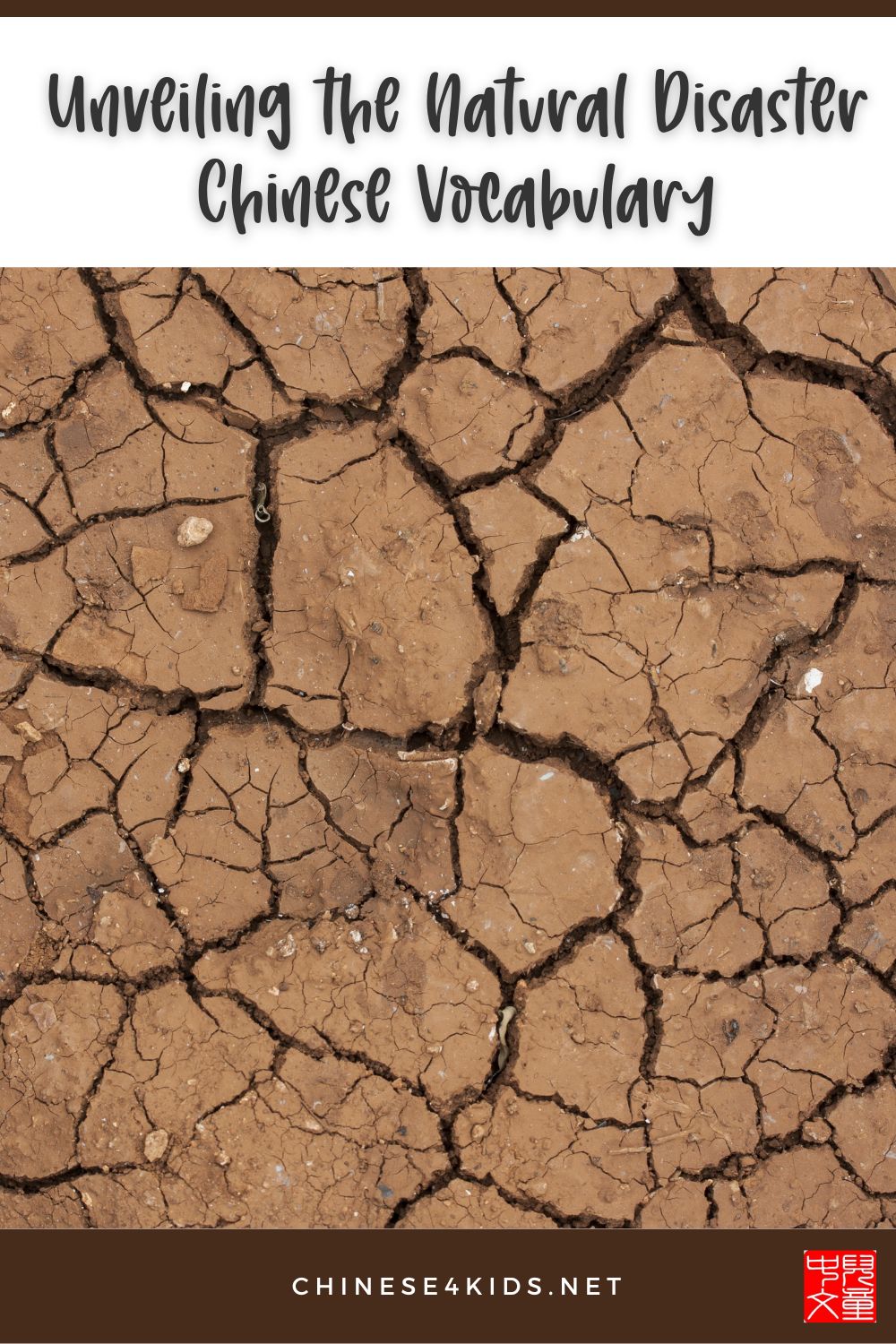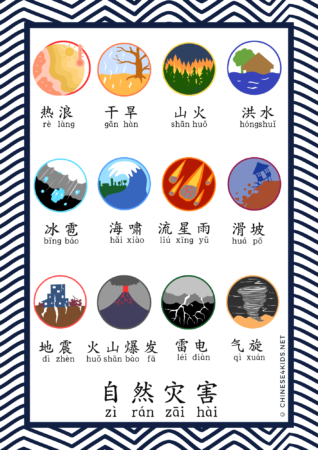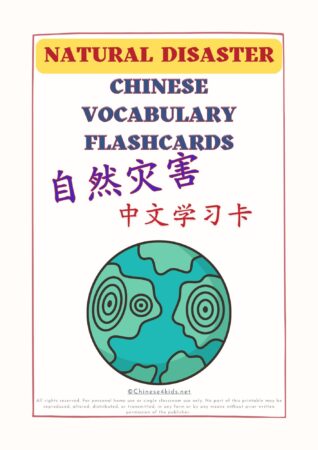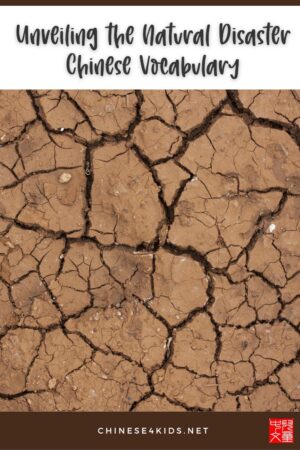
[ad_1]
Nature’s wrath is an simple power, and the Chinese language language displays its energy by means of a wealthy assortment of vocabulary associated to pure disasters. From historic instances to the current day, the Chinese language folks have witnessed and skilled a variety of catastrophic occasions, every leaving an indelible mark on their language and tradition. On this article, we are going to discover important Chinese language vocabulary associated to pure disasters, offering perception into a number of the commonest and devastating occurrences like drought, flood, tsunami, earthquake, wildfire, hailstorm, meteor bathe, landslide, volcanic eruption, cyclone, and lightning.
 Supply: Chinese language Studying Flashcards Hive
Supply: Chinese language Studying Flashcards Hive
Warmth wave 热浪 (rèlàng)
A heatwave is a interval of excessively sizzling climate that sometimes lasts for a number of days and even weeks. It’s characterised by unusually excessive temperatures, usually nicely above the typical for a selected area and time of yr. Throughout a heatwave, the climate circumstances can turn into oppressive and uncomfortable, posing well being dangers to people, particularly weak populations such because the aged, younger kids, and people with pre-existing well being circumstances.
“热浪” has two characters: “热” (rè) that means “sizzling” and “浪” (làng) that means “wave”
Instance:
在南欧,今年的夏季热浪异常严重,导致许多地区气温居高不下,人们纷纷前往海滩和公园寻求凉爽。
In South Europe, the heatwave this summer time has been unusually extreme, inflicting hovering temperatures in lots of areas. Individuals are flocking to seashores and parks to hunt reduction from the warmth.
Drought (干旱 – gānhàn)
Droughts are durations of extended dryness that considerably cut back water availability in an space. All through historical past, China has confronted extreme droughts, affecting agriculture, water assets, and day by day life.
“干旱” is a mixture of two characters: “干” (gān) that means “dry” and “旱” (hàn) that means “drought.” The time period underscores the gravity of this pure catastrophe.
Instance:
在北方地区,由于连续几个月的干旱,农作物产量大幅下降。
Within the northern area, as a result of a number of months of drought, crop yields have considerably decreased.
Flood (洪水 – hóngshuǐ)
Floods are overwhelming inundations attributable to extreme rainfall or the overflow of our bodies of water. China’s huge panorama and various local weather make it vulnerable to flooding, with the Yangtze River and different main waterways usually experiencing devastating floods.
The time period “洪水” consists of “洪” (hóng) that means “flood” and “水” (shuǐ) that means “water.”
Instance:
这次暴雨导致河水上涨,引发了严重的洪水灾情。
The heavy rainfall led to the rising of the river water, inflicting extreme flood disasters.
Tsunami (海啸 – hǎixiào)
Tsunamis are massive ocean waves triggered by underwater earthquakes or volcanic eruptions. Although much less frequent in China, they’ll have catastrophic penalties for coastal communities.
The time period “海啸” combines “海” (hǎi) that means “ocean” and “啸” (xiào) that means “roar,” emphasizing the highly effective nature of those waves.
Instance:
那次海啸给沿海地区带来了毁灭性的打击,损失惨重。
The tsunami introduced a devastating blow to the coastal area, inflicting huge losses.
Earthquake (地震 – dìzhèn)
Earthquakes are sudden and violent shaking of the bottom attributable to tectonic plate actions. China is vulnerable to earthquakes, and its lengthy historical past has witnessed quite a few catastrophic seismic occasions.
The time period “地震” consists of “地” (dì) that means “earth” and “震” (zhèn) that means “shake.”
Instance:
这次地震造成了大面积的建筑物损坏和人员伤亡。
The earthquake resulted in intensive constructing damages and casualties.
Wildfire (山火 – shānhuǒ)
Wildfires, or forest fires, are uncontrolled and damaging fires that unfold quickly by means of vegetation and forests. Although wildfire incidents in China are comparatively fewer than in another areas, they’ll nonetheless pose vital threats to the surroundings and human settlements.
The time period “山火” combines “山” (shān) that means “mountain” and “火” (huǒ) that means “hearth.”
Instance:
干燥的气候条件导致山火迅速蔓延,造成了大片林区的破坏。
Dry local weather circumstances led to the fast unfold of the wildfire, inflicting intensive harm to forested areas.
Hail (冰雹 – bīngbáo)
Hails are climate phenomena during which balls of ice, generally known as hailstones, fall from the sky throughout thunderstorms. These hailstones will be massive and trigger harm to crops and property.
The time period “冰雹” consists of “冰” (bīng) that means “ice” and “雹” (báo) that means “hail.”
Instance:
昨晚的冰雹天气对果园造成了很大的损失。
Final evening’s hailstorm triggered vital harm to the orchards.
Meteor Bathe (流星雨 – liúxīng yǔ)
A meteor bathe is a celestial occasion during which a bunch of meteors or “capturing stars” are noticed within the evening sky. It happens when the Earth passes by means of the particles left by a comet.
The time period “流星雨” combines “流星” (liúxīng) that means “meteor” and “雨” (yǔ) that means “rain.”
Instance:
今晚有预测会有流星雨,让我们一起观赏这美丽的自然现象吧。
There’s a forecast for a meteor bathe tonight; let’s watch this lovely pure phenomenon collectively.
Landslide (滑坡 – huápō)
Landslides are fast and sometimes damaging actions of rock, soil, and particles down a slope. Heavy rain, earthquakes, or volcanic exercise can set off landslides.
The time period “滑坡” combines “滑” (huá) that means “slide” and “坡” (pō) that means “slope.”
Instance:
暴雨过后,滑坡导致道路封锁,交通受到了严重影响。
After the heavy rain, landslides blocked the roads, severely affecting transportation.
Volcanic Eruption (火山爆发 – huǒshān bàofā)
Volcanic eruptions happen when magma, fuel, and ash are expelled from a volcano’s vent. Though China will not be as recognized for volcanic exercise as another international locations, it nonetheless experiences volcanic eruptions in sure areas.
The time period “火山爆发” combines “火山” (huǒshān) that means “volcano” and “爆发” (bàofā) that means “eruption.”
Instance:
那座火山突然爆发,喷发的岩浆和烟雾让人们惊恐不已。
The volcano erupted all of a sudden, and the spewing lava and smoke triggered nice worry among the many folks.
Cyclone (气旋 – qìxuán)
A cyclone is a climate system characterised by swirling winds round a low-pressure middle. It’s a broad time period that features hurricanes and typhoons.
The time period “气旋” combines “”气旋” combines “气” (qì) that means “air” or “environment” and “旋” (xuán) that means “rotation” or “swirl.” This time period aptly captures the round movement and atmospheric nature of cyclones.
Instance:
台风是一种强烈的气旋,其风力和降雨量可能给沿海地区带来毁灭性的影响。
Typhoons are highly effective cyclones that may deliver devastating impacts to coastal areas with their sturdy winds and heavy rainfall.
 supply: Pure Catastrophe Chinese language Vocabulary Montessori 3-Half Flashcards
supply: Pure Catastrophe Chinese language Vocabulary Montessori 3-Half Flashcards
Learning these vocabulary phrases gives a possibility to acknowledge the significance of local weather change consciousness and environmental conservation on a world scale. As language learners, we are able to respect how Chinese language vocabulary not solely displays the impression of pure disasters but in addition serves as a strong reminder of our collective duty to guard our planet and construct extra sustainable communities. Embracing the nuances of those phrases enriches our language expertise and cultural information whereas reinforcing the necessity for unity in safeguarding our world for future generations.
When you like this submit, share it

[ad_2]